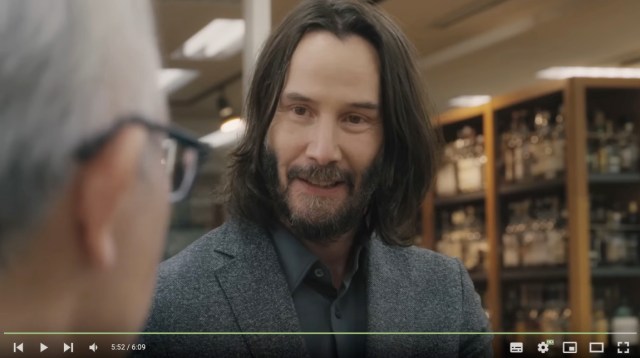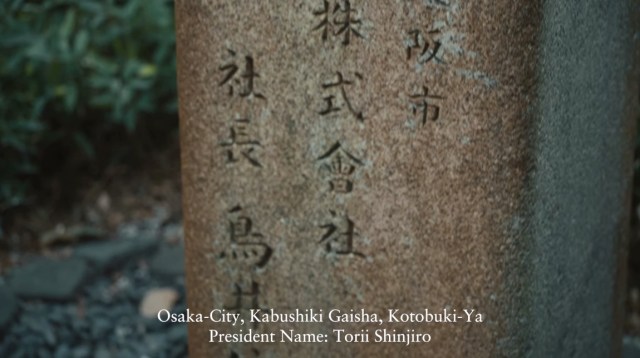
“An Exploration of Monozukuri with Keanu Reeves” takes us on a fascinating deep dive into Japanese craftsmanship, with Roman Coppola and the Hollywood star who was “staggered” when he first tasted Hibiki.
Japanese whisky has become a sought-after drink around the world, impressing whisky enthusiasts for whom one brand reigns supreme: Suntory.
Ever since Bill Murray’s character popularised the phrase “For relaxing times, make it Suntory time” in Lost in Translation, a 2003 movie filmed in Tokyo and directed by Sofia Coppola, sales have gone through the roof, with Suntory’s Hakushu 12 Year and Hibiki 17 Year completely selling out in 2018.
Now, it appears another Hollywood actor has a thing for Suntory, with Keanu Reeves fronting a new four-part series on Suntory called The Nature and Spirit of Japan: An exploration of Monozukuri with Keanu Reeves. Filmed by Sofia Coppola’s brother, Roman Coppola, the series explores four elements that combine to make Suntory what it is: Mizu (Water), Bi (Beauty), Kabuku (Transform) and Hibiki (Resonance).
▼ The first episode, “Water“, explores the prime ingredient without which there would be no Suntory whisky.
The above episode draws attention to some of the finer points in relation to ice and water and their relationship to the making and drinking of whisky, but one point they glean over is the stone marker on the site where the company was first founded in Osaka, which bears the name “Kotobukiya“, and the name of the founder, Shinjiro Torii.
▼ The history of the company, alluded to by this stone, is particularly fascinating.

Torii entered the industry in 1899 as a wine merchant, before one particular fortified wine called “Akadama” (literally “red sphere”) took off, leading him to expand the business into a company called “Kotobukiya” in 1921. Whisky-making followed soon after, with Torii setting up the Yamazaki distillery, Japan’s first distillery, in 1923, followed by the debut of Suntory whisky in 1929. The company eventually changed its name from Kotobukiya to Suntory in 1963, with the word “Suntory” combining the word “sun“, as a nod to the Akadama wine, whose meaning translates to “sun”, and “tory“, the Westernised version of Torii, the founder’s first name.
As this series of videos focusses on “monozukuri“, a word that literally translates to “the making of things” but is used to refer to handmade products or “craftsmanship”, it also explores different Japanese cultural traditions such as washi (Japanese paper), sumi (calligraphy ink), ikebana (flower arrangement) and touki (pottery).
▼ These topics are explored further in the second episode, “Beauty“.
Unfortunately, Reeves commits a common faux pas by standing in his socks in the genkan after taking off his shoes in this episode — your socked feet should only touch the inside of the house and not the outside area where the shoes go, requiring a direct step up from shoe to house to avoid dirtying your socks — but that’s something Noh mask maker Keiko Udaka will likely overlook as she focusses on imparting her essence into the exquisite pieces she makes.

Reeves also takes a wrong turn when crafting his own blend of whisky with 5th Generation Chief Blender Shinji Fukuyo, but his passion for the drink is clear to see, and this passion continues with the third instalment, “Transform“.
This episode focusses on the element of magic that all artists and artisans encounter during the process of creating their work — that unplanned flick of ink from that comes during a brushstroke, or a flavour from a blend that surprises even the blender. While artisans are able to craft products by drawing on their individual essence and years of experience, the materials themselves have an inherent wonder that takes flight during the process, or, in Reeves’ words, they “find their own voice and expression as the spirit becomes fully realised”.
The video ends with Reeves making an incredibly salient point that perfectly captures the essence of monozukuri or Japanese craftsmanship — the vision of refinement. Reeves quotes what he learnt from Suntory’s chief blender, saying:
“We must think about perfection but we must know that we will never have perfection“.
It’s an ethos that extends to all areas of Japanese life, from craftsmanship to martial arts, to the custom of “omotenashi” in the customer service industry, and even everyday relations, with the concept of ichigo ichie (literally “one life, one meeting”), where effort is made to make every encounter as memorable and cherished as possible.
▼ This insight into the Japanese mindset is a perfect segue into the last episode of the series, “Resonance“.
In this final episode, everything comes together, bringing what we’ve learned about the past together with the present, and discussing its ramifications for the people of today. It’s a deep subject that Reeves enjoys delving into, and he does so by expressing some deep and poetic statements about life, even leaving Shingo Torii, the third Generation Master Blender and grandson of founder Shinjiro Torii, bemused with his statement that whisky can make him want to “walk in the woods and go back to the water“.
One of Reeves’ most profound statements, however, comes towards the end, when he says:
“The art that you bring to it, the performance, the knowledge, the craft, that’s the best of being human.”
It’s a sentiment we couldn’t agree with more, and so, in this 100th year of Suntory celebrations, we raise a can of Hakushu and Yamazaki to both the iconic artisans of Japan and the Hollywood heavyweights who spent time getting to know them. Here’s hoping Reeves and Coppola return for more Japanese adventures!
Bar information
Bar High Five / バー ハイ・ファイブ
Address: Tokyo-to, Chuo-ku, Ginza 5-4-15, Efflore Ginza5 Bldg, B1F
東京都中央区銀座5-4-15 エフローレギンザ5ビル B1F
Open: 5:00 p.m.-11:30 p.m. (last order 11:00 p.m.)
Closed Sundays and public holidays
Source: YouTube/The House of Suntory
Featured image: YouTube/The House of Suntory
Insert images: YouTube/The House of Suntory
● Want to hear about SoraNews24’s latest articles as soon as they’re published? Follow us on Facebook and Twitter!

No hay comentarios:
Publicar un comentario